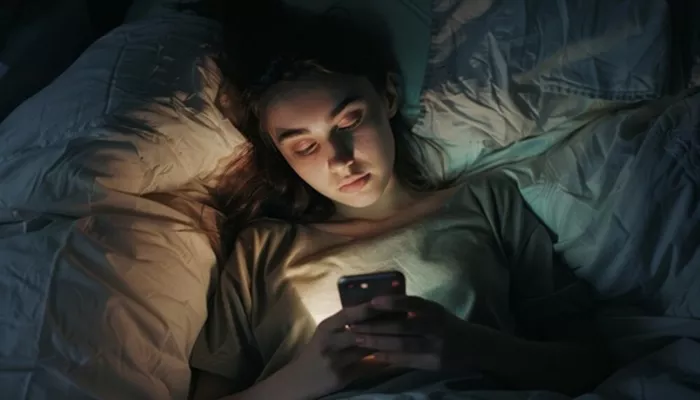A new study of over 45,000 young adults in Norway has uncovered a concerning link between screen use before bed and poor sleep outcomes. The research, published in Frontiers in Psychiatry, found that using a screen in bed increases the likelihood of insomnia by 59% and shortens sleep duration by an average of 24 minutes.
While the study explored various screen activities, such as social media use, gaming, and watching videos, the findings suggest that the time spent using screens in bed is a more significant factor than the type of activity. “The type of screen activity does not appear to matter as much as the overall time spent using screens in bed,” explained Dr. Gunnhild Johnsen Hjetland, lead author of the study and researcher at the Norwegian Institute of Public Health.
The research highlights that screen use itself—rather than specific activities like social media—appears to be the primary disruptor of sleep. “We found no significant differences between social media and other screen activities, suggesting that the key issue is screen use itself,” Hjetland added. The study points to “time displacement” as a key factor, where screen time delays sleep by taking away valuable rest time.
Sleep: An Essential, Yet Elusive, Necessity
Sleep is essential for both mental and physical well-being, but many young adults are struggling to get enough rest. The growing trend of using screens in bed is thought to contribute to this issue in multiple ways: notifications disrupt sleep, screen time replaces sleeping hours, engaging content keeps individuals awake longer, and light exposure from screens can delay circadian rhythms.
“Sleep problems are highly prevalent among students and can negatively impact mental health, academic performance, and overall quality of life,” said Hjetland. “Although previous studies have primarily focused on adolescents, we aimed to explore how different screen activities relate to sleep patterns in young adults.”
The study, which utilized data from the 2022 Students’ Health and Well-being survey, surveyed 45,202 full-time students in Norway, aged 18–28. Participants were asked about their screen use before bed, the types of activities they engaged in, and their sleep habits, including how long it took them to fall asleep, how often they had trouble staying asleep, and how frequently they felt tired during the day.
Researchers categorized the participants based on their screen activities—those who used social media exclusively, those who used other types of screens, and those who engaged in a mix of activities, including social media. They also assessed symptoms of insomnia, defined as trouble sleeping and daytime sleepiness occurring at least three times a week over a span of three months.
Increased Screen Time Leads to Sleep Disruption
The study revealed that for every additional hour of screen time after bedtime, the odds of experiencing insomnia symptoms increased by 59%, and sleep duration decreased by 24 minutes. Interestingly, social media use was not found to be more disruptive than other screen activities.
“The time spent using screens, rather than the specific type of activity, is the key factor in sleep disruption,” said Hjetland. This suggests that screen use cuts into valuable sleep time, rather than making individuals more wakeful.
Experts recommend reducing screen time before bed as a solution. “If you struggle with sleep, try to stop using screens at least 30–60 minutes before going to sleep,” Hjetland advised. “If you must use screens, consider disabling notifications to avoid disrupting your rest.”
Cultural Differences and Future Research
The researchers noted that the study focused on a single cultural context—Norwegian students—and acknowledged that the relationship between screen use and sleep could differ in other parts of the world. Additionally, the study grouped various screen activities together, such as gaming and listening to music, which may have different effects on sleep.
While the findings offer valuable insights, the study does not establish causality. “We cannot determine whether screen use directly causes insomnia, or if individuals with insomnia are more likely to use screens late at night,” Hjetland explained. Further research, including physiological assessments, would be needed to provide a more comprehensive understanding of the impact of screens on sleep patterns.
Related topics:
Time-Restricted Eating with Exercise Boosts Fat Loss, Preserves Muscle
Higher Education Linked to Faster Cognitive Decline After Stroke
Exosomes May Contribute to Cognitive Issues in Kids with Sleep Apnea

